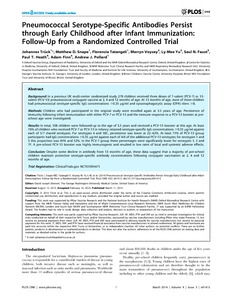Trück, J; Snape, MD; Tatangeli, F; Voysey, M; Yu, LM; Faust, SN; Heath, PT; Finn, A; Pollard, AJ
(2014)
Pneumococcal Serotype-Specific Antibodies Persist through Early Childhood after Infant Immunization: Follow-Up from a Randomized Controlled Trial.
PLOS ONE, 9 (3).
e91413 (1) - e91413 (11).
ISSN 1932-6203
https://doi.org/10.1371/journal.pone.0091413
SGUL Authors: Heath, Paul Trafford
![[img]](https://openaccess.sgul.ac.uk/107050/1.hassmallThumbnailVersion/pone.0091413.pdf)  Preview |
|
["document_typename_application/pdf; charset=binary" not defined]
Published Version
Available under License St George's repository terms & conditions.
Download (758kB)
| Preview
|
Abstract
Background: In a previous UK multi-center randomized study 278 children received three doses of 7-valent (PCV-7) or 13-
valent (PCV-13) pneumococcal conjugate vaccine at 2, 4 and 12 months of age. At 13 months of age, most of these children had pneumococcal serotype-specific IgG concentrations $0.35 mg/ml and opsonophagocytic assay (OPA) titers $8.
Methods: Children who had participated in the original study were enrolled again at 3.5 years of age. Persistence of immunity following infant immunization with either PCV-7 or PCV-13 and the immune response to a PCV-13 booster at preschool age were investigated.
Results: In total, 108 children were followed-up to the age of 3.5 years and received a PCV-13 booster at this age. At least 76% of children who received PCV-7 or PCV-13 in infancy retained serotype-specific IgG concentrations $0.35 mg/ml against each of 5/7 shared serotypes. For serotypes 4 and 18C, persistence was lower at 22–42%. At least 71% of PCV-13 group participants had IgG concentrations $0.35 mg/ml against each of 4/6 of the additional PCV-13 serotypes; for serotypes 1 and 3 this proportion was 45% and 52%. In the PCV-7 group these percentages were significantly lower for serotypes 1, 5 and 7F. A pre-school PCV-13 booster was highly immunogenic and resulted in low rates of local and systemic adverse effects.
Conclusion: Despite some decline in antibody from 13 months of age, these data suggest that a majority of pre-school
children maintain protective serotype-specific antibody concentrations following conjugate vaccination at 2, 4 and 12 months of age.
Trial Registration: ClinicalTrials.gov NCT01095471
| Item Type: |
Article
|
| Additional Information: |
Copyright: 2014 Truck et al. This is an open-access article distributed under the terms of the Creative Commons Attribution License, which permits unrestricted use, distribution, and reproduction in any medium, provided the original author and source are credited. |
| Keywords: |
Science & Technology, Multidisciplinary Sciences, Science & Technology - Other Topics, MULTIDISCIPLINARY SCIENCES, STREPTOCOCCUS-PNEUMONIAE, CONJUGATE VACCINATION, UNITED-KINGDOM, OTITIS-MEDIA, CHILDREN, CARRIAGE, BOOSTER, IMMUNOGENICITY, REPLACEMENT, DISEASE, General Science & Technology, MD Multidisciplinary |
| SGUL Research Institute / Research Centre: |
Academic Structure > Infection and Immunity Research Institute (INII) |
| Journal or Publication Title: |
PLOS ONE |
| ISSN: |
1932-6203 |
| Related URLs: |
|
| Web of Science ID: |
WOS:000332842400088 |
| Dates: |
| Date |
Event |
| 2014-03-11 |
Published |
|
| URI: |
https://openaccess.sgul.ac.uk/id/eprint/107050 |
| Publisher's version: |
https://doi.org/10.1371/journal.pone.0091413 |
Statistics
Item downloaded times since 17 Jul 2014.
Actions (login required)
 |
Edit Item |


